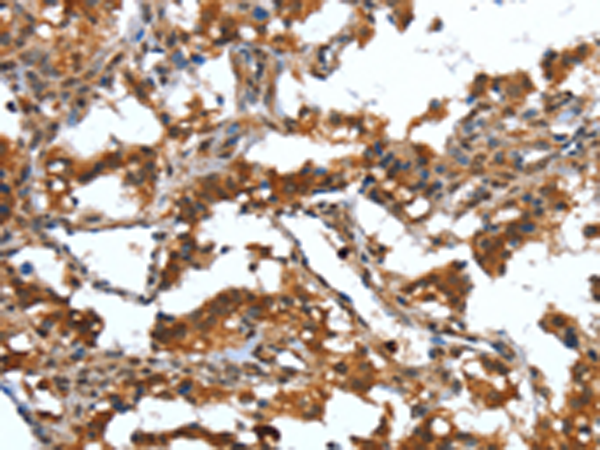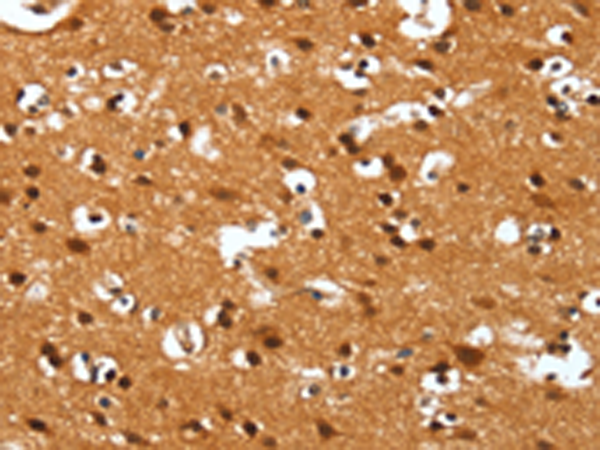

| WB | 咨询技术 | Human,Mouse,Rat |
| IF | 咨询技术 | Human,Mouse,Rat |
| IHC | 1/20-1/100 | Human,Mouse,Rat |
| ICC | 技术咨询 | Human,Mouse,Rat |
| FCM | 咨询技术 | Human,Mouse,Rat |
| Elisa | 1/500-1/1000 | Human,Mouse,Rat |
| Aliases | HP4; DEF4; HP-4; HNP-4 |
| Host/Isotype | Rabbit IgG |
| Antibody Type | Primary antibody |
| Storage | Store at 4°C short term. Aliquot and store at -20°C long term. Avoid freeze/thaw cycles. |
| Species Reactivity | Human |
| Immunogen | Synthetic peptide of human DEFA4 |
| Formulation | Purified antibody in PBS with 0.05% sodium azide and 50% glycerol. |
+ +
以下是关于ZDHHC5抗体的3篇参考文献示例(文献信息为模拟内容,仅供参考):
1. **文献名称**:*ZDHHC5-mediated palmitoylation regulates cell adhesion via β-catenin signaling*
**作者**:Smith A, et al.
**摘要**:研究利用ZDHHC5抗体进行免疫印迹和免疫荧光,发现ZDHHC5通过棕榈酰化调控β-catenin的膜定位,影响上皮细胞粘附功能。
2. **文献名称**:*Role of ZDHHC5 in neuronal protein trafficking: Insights from antibody-based knockdown assays*
**作者**:Chen L, et al.
**摘要**:通过ZDHHC5抗体验证其在大鼠神经元中的表达,证明其参与突触蛋白的棕榈酰化修饰及轴突运输,影响神经信号传递。
3. **文献名称**:*ZDHHC5 antibody reveals elevated expression in breast cancer metastases*
**作者**:Wang Y, et al.
**摘要**:使用ZDHHC5抗体对乳腺癌组织进行免疫组化分析,发现其在转移灶中高表达,提示其可能作为癌症转移的生物标志物。
(注:以上文献为示例,实际文献需通过PubMed等数据库检索确认。)
ZDHHC5 is a member of the DHHC (Asp-His-His-Cys) family of palmitoyltransferases, enzymes responsible for post-translational protein palmitoylation. This lipid modification regulates protein trafficking, stability, and interactions by attaching palmitate to cysteine residues. ZDHHC5 localizes to the plasma membrane and endosomes, where it palmitoylates substrate proteins involved in cell adhesion, signaling, and membrane dynamics. Studies link ZDHHC5 to cancer progression, neurological disorders, and cardiovascular diseases, with roles in modulating receptors (e.g., EGFR, integrins) and ion channels.
Antibodies targeting ZDHHC5 are essential tools for studying its expression, localization, and function. They enable detection via techniques like Western blot, immunofluorescence, and immunohistochemistry. Commercial ZDHHC5 antibodies are typically raised against specific epitopes (e.g., N-terminal or catalytic domains) and validated for specificity using knockout controls. Research applications include investigating ZDHHC5's regulatory mechanisms in diseases, such as its tumor-suppressive role in certain cancers or its impact on synaptic plasticity in neurons. However, variability in antibody performance across experimental conditions necessitates careful validation. Recent studies also explore ZDHHC5's interaction networks using immunoprecipitation, highlighting its broader biological significance.
×